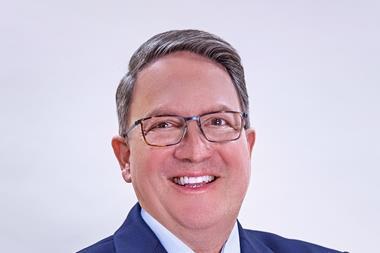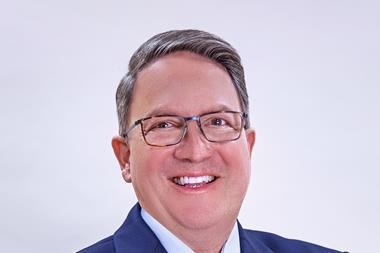Confident, but personable are the two words that spring to mind on e-meeting Mark Drusch, the new chief cargo officer at Qatar Airways, 16 working days into the role.
Drusch takes on the role of chief cargo officer at Qatar Airways more than four months after his predecessor Guillaume Halleux stepped down from the role to join Swissport as chief commercial officer.
However, the gap between Halleux leaving and Drusch joining hasn’t posed a challenge, says Drusch.
He is quick to commend Halleux for building a “brilliant” cargo operation during his time in the post.
“I really don't think the gap makes a difference either way. If anything, what Guillaume and the team have built has given me this fantastic platform to take it to the next level.”
The opportunity to take on the role was a surprise, admits Drusch. “This role came as quite a surprise to me quite honestly. It came sort of out of the blue.”
That said, Qatar Airways is not unfamiliar territory for Drusch, who joined the airline in December 2019 as senior vice president revenue management, alliances, loyalty, and strategy.
Over the last four years, he has led the development and implementation of the company’s revenue strategy as well as managing strategic alliances with key partner airlines.
The need for Qatar’s passenger and cargo businesses to work more closely together to manage rapid changes during the pandemic also saw Drusch gain a critical understanding of Qatar Cargo and work closely with the cargo management team.
It was then Qatar Airways’ chief commercial officer Thierry Antinori, who Drusch had worked closely with during this period, who suggested that Drusch, would be a good match for the job.
He reveals he had no expectation that the job would go to someone not working in cargo, because it wasn’t on his radar. “I honestly haven't thought about it,” he says.
But he had no hesitation in accepting the role because he feels excited about Qatar Cargo’s future.
“I love working at Qatar Airways. We have built this incredible brand, the airport is fantastic, Qatar is a lovely place to live. So, all the components are there. Quite honestly, it was an easy sell.”
Drusch certainly has a career history that will help him meet the demands of the role, having accrued more than 25 years of senior airline management experience.
His first aviation role was at Continental Airlines, where he spent 12 years as vice president of international and regulatory affairs, with stints as vice president for both strategic planning and international marketing.
He then spent another five years as senior vice president, network management at Delta Air Lines, where he was responsible for $16bn annual passenger revenue production through innovative planning, leadership, and management in nine critical areas.
His career path so far has also seen him take on the role of global senior vice president pricing and sales management for Lufthansa LSG Sky Chefs, chief executive and co-founder of e-Rewards and e-Miles, specialising in online panel research and online advertising, chief supply relations officer at online travel agency Fareportal, president of investment enterprise TBG, and vice president at global consulting and technology services company ICF.
Financial credentials
Drusch also has a knack for finance. He began his career in the 1980s with a three-year stint in banking. Being responsible for new international business as an international banking officer at First City Bank of Houston helped give him a grounding for later financial responsibilities in his career.
“It was the best MBA you could ever hope for. I was trained from the beginning on how to understand cashflow, profit and loss (P&L) and balance sheet management.”
This has set him up to now consistently consider how to run operations with the above in mind, he points out.
“I tell everybody, that's the best way to get started in business. Nobody will go wrong if they start that way.”
Setting up and running e-commerce companies has also taught him vital business lessons that can be utilised within his new role, he says.
With the exception of safety, experimenting is a rite of passage for businesses, he suggests, “because until you put it in the marketplace, you don't know if it'll be successful or not”.
He adds: “The other thing I learned from running a business is to think boldly. Because the bolder you think, the more likely you are to have a home run. Think boldly and then try to deliver against that bold vision.”
Strategic plans
On the subject of safety, this is at the top of Qatar Cargo’s priority list for this year and beyond, Drusch says.
“I want to make sure we are always ahead of the game. If there's something that makes sense for us and improves safety, I want to be on top of it. That includes not just technology, but processes and how we work with outside ground handlers.”
Further building and evolving the cargo team is also important.
“I want to take big revolutionary steps, not just evolutionary steps,” he ventures.
Within operations, he also plans to develop analytics to optimise the cargo network, as well as develop partnerships.
On this goal, he explains that partnerships were a major part of his work in Qatar’s passenger business, and that while building partnerships within cargo is more complex than passenger, it is more than possible.
“Nothing that we want to do that would build a partnership within cargo requires you to change the laws of physics, it's all just more work, a little more creativity, and a little more effort. None of this is impossible.”
Plus, he aims to better integrate Qatar Cargo into Qatar Airways. “As much as we're innovating right now, I think there's even more we can do,” he elaborates.
Further, he says, Qatar Cargo will focus on digitalisation, technology and sustainability.
Digitalisation is “key” in terms of delivering value for customers, he stresses.
“As we push digitalisation, we can find things that are more effective, more efficient, allow the customers to be able to track what they're doing better, allow us to free up our own people to focus on selling and managing capacity - meaning supporting our customers and giving them opportunities.”
Technology also needs to evolve and adapt as the industry is developing, he stresses, using the airline’s 2022 order for 34 (with 16 additional options) Boeing 777-8 freighters as an example of how crucial this function is to ensure aircraft fulfil their full lifecycle.
“Technology, I think, is what creates for all of us a more efficient market and therefore the ability to grow economically in all markets,” he reflects.
While on the subject of sustainability, he acknowledges that Qatar has a challenge ahead to reach its net-zero carbon emissions by 2050 goal, but practical plans are now beginning to match boardroom discussion, he says approvingly.
“This is now real. We're now actually getting down to brass tacks and trying to parse out how we achieve these goals. What are the obstacles? How do we solve this? Are there some unique solutions we haven't even thought about?” he ponders.
As for air cargo demand, Drusch says he is “cautiously optimistic” for this year, but, despite any misgivings he may have, he gives the impression that no stone will be left unturned in the task of making sure Qatar Airways Cargo will be up to the job of managing whatever the market throws at it.















